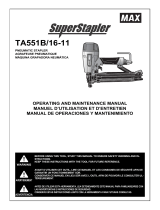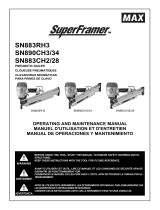
4
2. EAR PROTECTION MAY BE REQUIRED IN SOME ENVI-
RONMENTS
As the working condition may include exposure to high
noise levels which can lead to hearing damage, the employ-
er and user should ensure that any necessary hearing pro-
tection is provided and used by the operator and others in
the work area.
3. DO NOT USE ANY POWER SOURCE EXCEPT AN AIR
COMPRESSOR
The tool is designed to operate on compressed air. Do not
operate the tool on any other highpressure gas, combusti-
ble gases (e.g., oxygen, acetylene, etc.) since there is the
danger of an explosion. For this reason, absolutely do not
use anything other than an air compressor to operate the
tool.
4. OPERATE WITHIN THE PROPER AIR PRESSURE
RANGE
The tool is designed to operate within an air pressure range
of 5 to 6.9 bar (70 to 100 p.s.i.).
The pressure should be adjusted to the type of the work be-
ing fastened. The tool shall never be operated when the op-
erating pressure exceeds 6.9 bar (100 p.s.i.).
Never connect the tool to air pressure which potentially ex-
ceeds 13.8 bar (200 p.s.i.) as the tool can burst.
5. DO NOT OPERATE THE TOOL NEAR A FLAMMABLE
SUBSTANCE
Never operate the tool near a flammable substance (e.g.,
thinner, gasoline, etc.). Volatile fumes from these substanc-
es could be drawn into the compressor and compressed to-
gether with the air and this could result in an explosion.
6. NEVER USE THE TOOL IN AN EXPLOSIVE ATMOS-
PHERE
Sparks from the tool may ignite atmospheric gases, dust or
other combustible materials.
7. DO NOT USE A WRONG FITTINGS
The connector on the tool must not hold pressure when air
supply is disconnected. If a wrong fitting is used, the tool
can remain charged with air after disconnecting and thus
will be able to drive a fastener even after the air line is dis-
connected, possibly causing injury.
8. DISCONNECT THE AIR SUPPLY AND EMPTY THE
MAGAZINE WHEN THE TOOL IS NOT IN USE
Always disconnect the air supply from the tool and empty
the magazine when operation has been completed or sus-
pended, when unattended, moving to a different work area,
adjusting, disassembling, or repairing the tool, and when
clearing a jammed fastener.
9. INSPECT SCREW TIGHTNESS
Loose or improperly installed screws or bolts cause acci-
dents and tool damage when the tool is put into operation.
Inspect to confirm that all screws and bolts are tight and
properly installed prior to operating the tool.
10. DO NOT TOUCH THE TRIGGER UNLESS YOU INTEND
TO DRIVE A FASTENER
Whenever the air supply is connected to the tool, never
touch the trigger unless you intend to drive a fastener into
the work. It is dangerous to walk around carrying the tool
with the trigger pulled, and this and similar actions should
be avoided.
11. NEVER POINT THE DISCHARGE OUTLET TOWARD
YOURSELF AND OTHER PERSONNEL
If the discharge outlet is pointed toward people, serious ac-
cidents may be caused when misfiring. Be sure the dis-
charge outlet is not pointed toward people when connecting
and disconnecting the hose, loading and unloading the fas-
teners or similar operations.
Thinner
Gasoline













